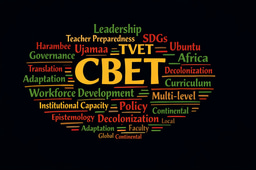Is the ‘Nexus’ a buzzword? No, it builds links in science and life
Published in Sustainability

It is hard to imagine any resource being produced or processed or used without using others. Producing energy requires water and vice versa. The ubiquitous plans for new hydropower dams all over the world will intervene into regimes for water and land use, and their construction will require tonnes of materials; their contribution to energy security depends on managing rainfall variability upstream and managing energy demand across users. Authors as diverse as Brahma Chellaney, the US National Intelligence Council (NIC) and academic Declan Conway address transboundary security challenges for Asia and Africa. In a nutshell, delivering the UN SDGs will require new and additional attempts to integrate resource management across the various siloes of planning, or mankind is condemned to accept increasing pressure on the environment, on livelihoods, and on systems of provision stemming from increasing resource use.
Debate around increasing demand for natural resources is often framed in terms of a “nexus” and perhaps at risk of becoming a buzz word as a recent editorial in ‘Nature’ has suggested. A nexus between what, at what scales, and what would be the consequences? Our article seeks to give a response. We define the resource nexus as a set of context-specific critical interlinkages between two or more natural resources used in delivery chains towards systems of provision for water, energy, food, land, and materials. Thus we differ from the many case studies that exist and a more narrow ‘Energy-water-food’ nexus and explain why critical interlinkages may occur between corresponding or different layers. Trying to shape the broader debate we propose perspectives that could lead to a reload of climate policy with buy-in from supply chain managers and resource-rich developing countries. Our research perspectives address modelling approaches and scenarios at the interface of bio-physical inputs with the human dimensions of security and governance. Research on multi-level, polycentric resource governance in dialogue with modelling efforts will help inform choices and planning evidence
Pulling this perspectives article together we assembled authors who have been in the nexus debate since it started to emerge in 2011/12 at the Bonn Conference and the Transatlantic Academy in Washington D.C., and we asked others to join. As usual, it’s been a journey from coming together and planning a first outline in 2016 following an inspiring suggestion made by John Schellnhuber, taking advantage of editing and contributing to the Routledge Handbook of the Resource Nexus published in early 2018 with 32 chapters on the topic, and a range of other fascinating discussions revolving around feedback and reviews and workshops. Seeing it now published makes us proud and confident the nexus debate is alive and progresses well, with the hope that nexus research could become salient for the integrated, effective and efficient implementation of SDG and help planners overcome silo mentality and enable more synergistic approaches.
Written by Raimund Bleischwitz, Catalina Spataru, Stacy VanDeveer
Follow the Topic
-
Nature Sustainability

This journal publishes significant original research from a broad range of natural, social and engineering fields about sustainability, its policy dimensions and possible solutions.
What are SDG Topics?
An introduction to Sustainable Development Goals (SDGs) Topics and their role in highlighting sustainable development research.
Continue reading announcement





Please sign in or register for FREE
If you are a registered user on Research Communities by Springer Nature, please sign in